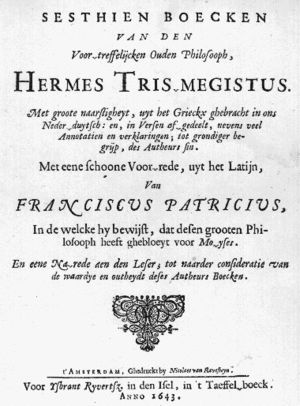Corpus Hermeticum

The Corpus Hermeticum, also called Poimandres after the title of the first text (Greek: Ποιμάνδρης "shepherd of men", from ποιμήν poimén "shepherd" and ἀνήρ anēr "man, human being"; Old Egyptian: Peime-nte-rê "Wisdom of Re"), is a collection of Greek treatises in epistolary, dialogue and sermon form on the origin of the world, the shape of the cosmos and human and divine wisdom. Hermes Trismegistus, to whom a multitude of religious, astrological and magical writings were attributed, was considered the author in ancient times.
Origin
The Corpus Hermeticum was written between 100 and 300 AD; the authors were probably Greeks who processed popular philosophical ideas of the time, "a mixture of Platonism and Stoicism, combined with Jewish and possibly some Persian elements".[1] It is disputed whether the interwoven elements of Egyptian mysteries indicate the involvement of Egyptian Neoplatonists, or whether it is pure fiction aimed at the enthusiasm for oriental cults typical of the time.
Other surviving Hermetica are the Asclepius, which was handed down together with the works of Apuleius of Madaura, as the latter was thought to be the translator of the lost Greek original (Coptic fragments of this were also found in the Nag Hammadi Library, Codex VI,8) and a very popular astrological aphorism collection entitled Centiloquium Hermetis, of which more than 80 manuscripts as well as several prints from the period between 1484 and 1533 have survived. In addition, there was the Tabula Smaragdina Hermetis, which had a great influence on alchemy, and the astral magical manual Picatrix; two Hellenistic writings that were handed down in the Islamic cultural sphere and translated from Arabic in the Middle Ages.
Literature
- Frances A. Yates: Giordano Bruno and the Hermetic Tradition. London/New York 1964. Paperback London/Chicago 1991. ISBN 0-226-95007-7
References
- ↑ F. Yates (1991), p. 3.
| This article is partly based on the article Corpus Hermeticum from the free encyclopedia de.wikipedia and is licensed under Creative Commons Attribution/Share Alike. Wikipedia has a list of authors available. |
